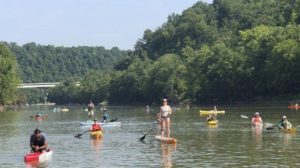- Emily Patricke
- patrick@richmondregister.com
A two-hour drive to attend an early Saturday morning event might be extreme to some, but for Evan Young of West Virginia, “It seemed like a short drive for such a great cause.”
On a sunny morning at Fort Boonesborough State Park, about 70 people paddled out into the water to observe 8 minutes and 47 seconds of silence — the exact amount of time George Floyd laid on the ground under the knee of a police officer in Minneapolis, Minnesota, weeks ago.
The event, hosted by the Explore Kentucky Initiative, The Waterman Series and members of the paddle board community, began with guest speakers who discussed not only the issues of racism and identity bias in law enforcement, but also other issues regarding people of color and outdoor activities.
Gerry Seavo James, the founder of the Explore Kentucky Initiative, discussed the complicated history between people of color and outdoor parks. According to James, Black people were only allowed to enter one Kentucky State Park up until the ’60s. Today, these recreational areas are still “places of pain” for some.
Candidate for State Representative of the 81st District Martina Jackson attended the event and was one of the guest speakers. Jackson said issues of race and inclusion often go further than police brutality and can be found in even the smallest aspects of daily life.
“Diversity and inclusion means other aspects like the outdoors. Part of that conversation is saying ‘why don’t we see more people of color in outdoor recreational activities?’” Jackson said.
According to James, natural areas in Kentucky historically had “sundown towns” around them — towns that required any Black person(s) to exit the town before sundown. This and other historical aspects may have led to unconscious biases about people of color and their participation in outdoor activities, James said.
“The big thing is that we want people to be focusing on inclusivity and unconscious biases, (such as) unconscious biases that Black people don’t want to go kayaking and hiking,” James said.
Other issues may evolve from socioeconomic status. Jackson said neighborhoods that are lower income or historically Black are less likely to receive funding for things like parks and hiking trails. This continues to discourage children of color to become involved in outdoor activities.
James said the event had a good turnout and that people from all around the state came, as well as some who travelled from out of state like Young.
Young said when he was asked to attend the event, it was almost an instant yes. He explained he is close with James and promotes attending events that raise awareness for such important topics.
“It was great how Gerry got it started. (It was) nice to take a moment and listen to their stories and then getting out on the water for that 8 minutes was just moving. We were all united and silent for a reason. It was one of those divine moments,” Young said.
Young, who owns Appalachian Boarding Company, brought a van full of paddle boards for participants who wanted to pop in the water and participate. He said the paddle board community is very inclusive of “any age, race, religion, creed or color,” and events like this continue to highlight that sense of unity.
James said he hopes events such as this one help to open up people’s minds about how we view racism and racial injustice.
“We kind of have this cookie cutter view on racism and discrimination. We think, ‘Oh OK, slavery ended,’ and ‘Oh OK, Martin Luther King and desegregation,’ but people don’t think about the systematic structures (still in place today),” he said.
Jackson also expressed her hope for the larger community to open their eyes to the smaller issues people of color still face.
“We want everyone to be represented and really enjoy life and not have these barriers in place, from police brutality to outdoor activity. We start by showing up and building,” Jackson stated.

